There are precisely 0 CDs of Ludford’s music currently
widely available in the UK. It surely can’t be because his music was
discovered only comparatively recently or that it’s composed in a style
that would have been old-fashioned well before the end of his life.
Indeed, he appears to have abandoned composing around 1535, though St
Stephen’s Westminster, which he served, was not closed until 1547.
He ceased to compose around the same time as and perhaps for the same
reason as his contemporary Taverner who, perhaps apocryphally, is reported
to have regretted having composed Popish ditties. If, as is often supposed,
Ludford disliked the new simpler style, he could have taken up his pen
again in the reign of Queen Mary, in whose time he was still drawing
his annuity in 1556. Whatever the reason, if you like Taverner’s music,
you should also enjoy Ludford’s.
Some, but by no means all suppliers have the New College recording on
the K617 label and others have the two Blue Heron recordings listed
below as expensive imports. The four ASV recordings made by The Cardinall’s
Musick in 1993-1995 are crying out for reissue along with many other
fine recordings of the music of the Tudor period on that label; they
are currently available only at inflated prices – up to £321 for the
box set.
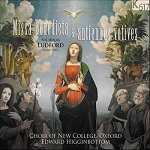
We
must be thankful that four recordings of Ludford’s music are available
as downloads. One of these I have already reviewed briefly in February
2009 in a survey of available recordings by New College Choir, Oxford,
directed by Edward Higginbottom. As I said then, the music offers 63
minutes of sheer delight, excellently performed. The recording, on the
K617 label,
K617206 [63:05], contains the 6-part Marian
Missa
Benedicta et Venerabilis, 45:27 with plainsong Introit, Gradual,
Alleluia, Offertory and Communion, all related to feasts of the Virgin
Mary, and the votive antiphons
Ave cuius conceptio [8:03] and
Domine Jesu Christe [9:41]. The performances, very minor quibbles
apart, are most convincing. There’s no polyphonic
Kyrie for this
Mass, though one of the Sarum plainsong settings could have been included.
At the time of writing only amazon.co.uk among UK-based suppliers seem
to stock the CD. The download from
emusic.com costs £4.62 or less, comes without texts or notes and the bit-rate hovers
around a merely adequate 192kb/s, but the recording, made in the church
of Saint-Martin de Hoff, Sarrebourg, France, in July 2007, sounds well.
7digital.com have it in 320kb/s mp3 or mp4 for £7.49, again without
texts. You’ll find some information on the New College website –
here.
The Boston (US) based group Blue Heron directed by Scott Metcalfe are
recording the music of the Peterhouse (Cambridge) Partbooks on their
own label. They have two albums, both offering premiere recordings in
editions by Nick Sandon:
•
BHCD1003 Ludford’s
Missa Regnum Mundi, with appropriate
propers chanted as for the feast of St Margaret, and Richard Pygott’s
(c.1485-1549)
Salve Regina. [79:40] Like most Tudor composers,
Ludford did not set the
Kyrie polyphonically, so the album opens
with the Introit
Me expectaverunt peccatores (The ungodly lay
in wait for me to destroy me but I will consider thy testimonies) and
Kyrie XII from the Sarum Missal. Pdf booklet of notes, texts
and translations
here.
•
BHCD1004 [59:58] Ludford’s
Missa Inclina cor meum preceded
by John Mason’s (c.1480-1545) Marian antiphon
Ave fuit prima salus.
As on the previous album, a Sarum Kyrie is chanted before the
Gloria.
Sample tracks from both are available at http://blueheronchoir.org/
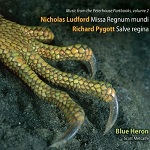
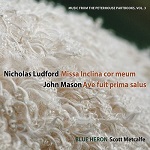 Short
of having The Tallis Scholars, The Sixteen or The Cardinall’s Musick
record this music, these full-bodied recordings are about as good as
it gets. Very minor reservations aside, such as the inaudibility of
some of the words – always a problem with polyphonic music, especially
music as florid as Ludford’s – these would be my two top recommendations
for getting to know Ludford’s music. In any case, though there are no
texts with either of these downloads, you need only follow the link
above to obtain the booklet of notes, texts and translations of BHCD1003.
With luck, the booklet for the other album will appear soon.
Short
of having The Tallis Scholars, The Sixteen or The Cardinall’s Musick
record this music, these full-bodied recordings are about as good as
it gets. Very minor reservations aside, such as the inaudibility of
some of the words – always a problem with polyphonic music, especially
music as florid as Ludford’s – these would be my two top recommendations
for getting to know Ludford’s music. In any case, though there are no
texts with either of these downloads, you need only follow the link
above to obtain the booklet of notes, texts and translations of BHCD1003.
With luck, the booklet for the other album will appear soon.
The recordings are close but good, even though the Amazon downloads
are not at the full 320kb/s bit-rate, hovering around the 230-240 mark.
The Blue Heron website offers both mp3 and lossless flac downloads.
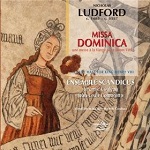 A
recording of another Lady Mass, Missa Dominica by the all-male
Ensemble Scandicus directed by Jérémie Couleau and Jean-Louis Comoretto,
recorded in November 2012 and released in 2013 on the Arion/Pierre Verany
label (PV713111 [58:49]) is advertised as Une messe à la vierge
pour Henry VIII but I can find scant information about it. What,
for example, is the provenance of the polyphonic Kyrie , which
Ludford normally did not set? Here, too, the music of the Mass is completed
with plainsong Marian propers: Gradual (Ave præclara), Offertory
(Felix namque) and Communion (Beata viscera).
A
recording of another Lady Mass, Missa Dominica by the all-male
Ensemble Scandicus directed by Jérémie Couleau and Jean-Louis Comoretto,
recorded in November 2012 and released in 2013 on the Arion/Pierre Verany
label (PV713111 [58:49]) is advertised as Une messe à la vierge
pour Henry VIII but I can find scant information about it. What,
for example, is the provenance of the polyphonic Kyrie , which
Ludford normally did not set? Here, too, the music of the Mass is completed
with plainsong Marian propers: Gradual (Ave præclara), Offertory
(Felix namque) and Communion (Beata viscera).
I’m pleased to have a recording of this work and enjoyed hearing the
album, but I’m slightly less impressed by the performance than I am
by the K617 and Blue Heron recordings. I don’t want to make too much
of my reservation, which 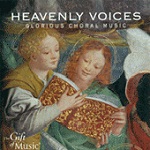 has
more to do with the lack of information. The tone of this ensemble is
rather darker-hued than that of the other ensembles, as is apparent
from the opening Kyrie. If you know Marcel Pérès’ recordings
with Ensemble Organum, it’s akin to his style.
has
more to do with the lack of information. The tone of this ensemble is
rather darker-hued than that of the other ensembles, as is apparent
from the opening Kyrie. If you know Marcel Pérès’ recordings
with Ensemble Organum, it’s akin to his style.
For US readers amazon.com have the CD at $8.99. The least expensive
download in full 320kb/s mp3 is from play.google.com at £6.99 – all these albums except the K617 recording can be sampled
from there.
Finally there’s a recording by the Oxford Girls’ Choir (with some male
assistance) of Ludford’s Ave cuius conceptio on an album of 15th-century
and Tudor church music entitled Heavenly Voices (Gift of Music CCLCDG1181 – £4.99 from classicsonline.com or stream from Naxos Music Library). The performance is noticeably slower
than that on the New College recording, but none the worse for that.
There are no texts or notes, however.











